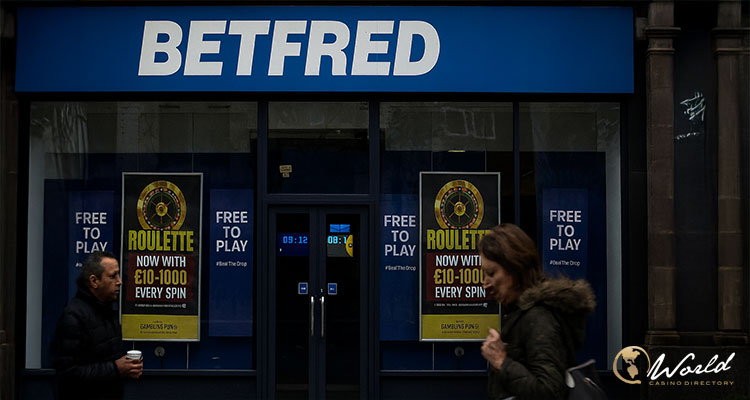Betfred has cautioned that its entire network of UK betting shops could vanish if Chancellor Rachel Reeves proceeds with a plan to increase gambling taxes. The bookmaker’s chairman and co-founder, Fred Done, said a tax hike would threaten the survival of all 1,287 outlets and put roughly 7,500 jobs at risk.
“This is the biggest threat I have known since I’ve been in the industry,” Done told the BBC, adding that the industry’s future was in jeopardy. The warning mirrors concerns voiced by other gambling giants, including William Hill, Paddy Power, and Ladbrokes’ owner, Entain.
Done founded Betfred in 1967 with his brother Peter and has since become one of the UK’s most recognizable figures in the betting industry. Despite decades of growth, he said current economic pressures and potential tax changes are pushing the business to breaking point.
Tax Hike Push Gains Momentum
Rachel Reeves, the newly appointed chancellor, has faced growing calls to raise taxes on gambling operators. Former Prime Minister Gordon Brown and more than 100 Labour MPs have urged her to increase duties on betting and gaming, arguing that the move could generate up to £3.2 billion annually — funds that could be used to combat child poverty.
Reeves told ITV News, “I do think there is a case for gambling firms paying more… they should pay their fair share of taxes and we will make sure that happens.” Reports suggest the Treasury is weighing up an increase in general betting duty from 15% to as high as 30%, and online gaming and slot machine duties from 20% to potentially 50%.
However, industry leaders warn that such changes would devastate the retail betting landscape. Betfred’s chief executive, Joanne Whittaker, revealed the company would “lose the whole retail business” if the tax plan went ahead. “We’ve got people in the Treasury who don’t understand our business,” she said, adding that she had written to both Reeves and Culture Secretary Lisa Nandy to warn of the impact.
Jobs, Shops, and the High Street at Risk
Done said that even a smaller rise could cripple operations. “It doesn’t even need to go up to 50%. If it went up to anywhere like 40% or even 35% there is no profit in the business. We would have to close it down. I’m talking job losses. We’re talking probably 7,500,” he said.
Currently, Betfred operates nearly 1,300 shops across the UK. Done revealed that about 300 of those are already unprofitable, and a 5% increase in gambling taxes could push that number to more than 400.
He added that recent rises in the minimum wage and employer National Insurance contributions had already inflated company costs by £20 million. “Slowly it will go online,” he acknowledged, “but we’re talking, without tax increases, we’ve still got probably 20 years of life on the High Street.”
Competitors are facing similar challenges. William Hill’s parent company, Evoke, has warned it could shut around 200 outlets, while Paddy Power has already announced the closure of 57 stores across the UK and Ireland due to rising costs and changing consumer habits.
Critics and Social Concerns
Supporters of higher gambling taxes point to the social toll of betting. Research from the Office for Health Improvement and Disparities estimated the financial cost of gambling-related harm to the UK at between £1 billion and £1.77 billion annually.
Prof. Ashwin Kumar of the Institute for Public Policy Research argued that taxes should rise to reflect the harm caused by gambling. “We know that most of the profits made by gambling companies come from a very small number of gamblers, many of whom are at risk of serious harm,” he said. “And so we think that the duties should be higher, just like tobacco and alcohol.”
Charity GambleAware echoed those concerns, calling for tighter advertising regulations to protect children and increase awareness about gambling risks.
Done, however, maintains that UK-based betting shops play a key role in consumer protection. He argued that closing domestic operators would only push customers toward unregulated offshore sites, which pay no taxes to the UK government. “Once the industry is closed down, it’s gone. People will still bet, but they’ll bet offshore,” he said.
Future Uncertain Ahead of Autumn Budget
The UK gambling sector currently contributes several types of taxes, including 21% on online casino gaming stakes, 20% on slot machines, and 15% general betting duty on sports and horseracing. Yet, with the Autumn Budget on the horizon, further increases remain on the table.
Critics warn that pushing duties too high could backfire — reducing tax revenue, accelerating black-market betting, and hollowing out Britain’s High Streets. Whittaker said the proposed increases would “produce the opposite of their intended effect: reducing tax revenue, [and] accelerating black market growth.”
A spokesperson for HM Treasury declined to comment on speculation, saying, “We do not comment on speculation around future changes to tax policy.”
As the government considers its next move, the fate of thousands of betting shop employees and the future of Britain’s high-street gambling landscape hang in the balance.



